HubSpot Integration
Contents
- Overview
- Enabling the Integration
- Disabling the Integration
- Configuring the Integration
- Company Enrichment
- Company Property Mappings
- Calculated Values for Companies
- Manual Creation
- Manual Enrichment
- Bulk Creation
- Bulk Creation (CSV Import)
- Automatic Enrichment
- Automatic Company Creation
- Activity Timeline
- Contact Enrichment
- Using HubSpot Data within Store Leads
- Best Practices
- Information Security Considerations
Overview
HubSpot is a leading customer relationship management platform.
With the HubSpot integration enabled, accounts on all paid plans can manually create new HubSpot companies from Store Leads domains. Existing HubSpot companies can also be manually updated.
Accounts on the Pro, Elite or Enterprise plans can also:
- Update all existing HubSpot companies and contacts with the latest Store Leads data. This can be configured to happen automatically as soon as we refresh our data (weekly) or triggered manually.
- Automatically update HubSpot companies and contacts when they are manually created or modified within HubSpot.
- Automatically create new HubSpot companies for any new stores on a list.
- Automatically create new HubSpot contacts from the non-personal email addresses in the Store Leads database.
- Export domains to a CSV file that is compatible with HubSpot CSV import. This is useful for initially creating companies in HubSpot or for manual bulk updates.
Enabling the HubSpot Integration
-
To enable the HubSpot integration, visit the Integrations page in the Dashboard and click on HubSpot.
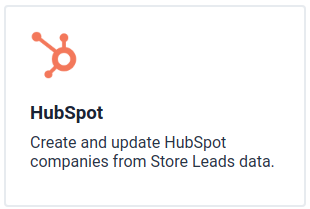 HubSpot Integration Summary.
HubSpot Integration Summary. -
You'll see a page that summarizes the HubSpot integration. Click the enable button to proceed.
 Enable HubSpot Integration.
Enable HubSpot Integration. -
At this point, you may be asked to login to your HubSpot instance. You'll also be asked for permission to allow Store Leads to manage data in your HubSpot instance. You must approve this request in order to use the HubSpot integration.
Once you approve the request, your HubSpot integration will be enabled. As soon as the integration is enabled, we scan your HubSpot instance to determine the overlap between companies in HubSpot and domains in the Store Leads database.
Connecting to HubSpot with Individual Accounts
When the HubSpot integration is enabled by the Store Leads account owner, it establishes an "Organization Connection" to HubSpot. This means that:
- All automated actions that Store Leads performs in HubSpot will be done using the HubSpot credential supplied when establishing the organization connection.
- If you have shared access to your Store Leads account with other users, then any manual actions performed by those users will also default to using the HubSpot credentials of the organization connection. To fix this, each Store Leads user can also connect to HubSpot using their own HubSpot account credentials. Doing so ensures that accounts created manually by a user are attributed to the right person in HubSpot. Each account should visit the Integrations page, click on the "HubSpot" link and then click on the "Connect to HubSpot" button.

Disabling the HubSpot Integration
If you wish to deactivate the integration, simply click the disable button.

Configuring the HubSpot Integration
After the integration is enabled, choose which objects within HubSpot should be enriched. Enrichment of companies, contacts and even custom objects is supported.

Next, review the available configuration options under the General tab.
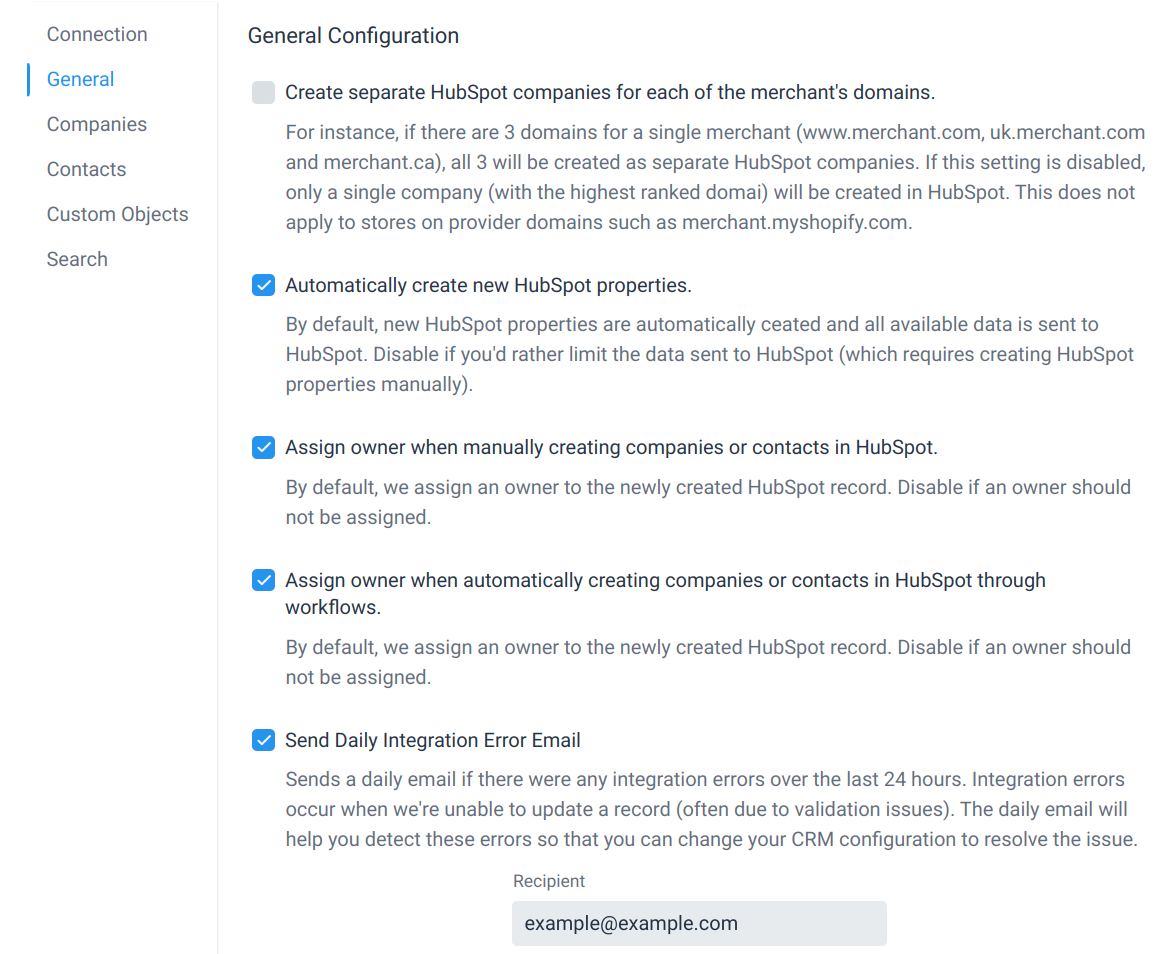
- Create separate HubSpot companies for each of the merchant's subdomains. If there are 3 domains for a single merchant (www.merchant.com, uk.merchant.com and merchant.ca), all 3 will be created as separate HubSpot companies if this option is enabled. If this setting is disabled, only a single company (with the highest ranked domain) will be created in HubSpot.
- Automatically create new HubSpot properties.. By default, new HubSpot properties are automatically created and all available data is sent to HubSpot. Disable if you'd rather limit the data sent to HubSpot (which requires creating HubSpot properties manually).
- Assign owner when manually creating companies or contacts in HubSpot.. By default, an owner is assigned to newly created HubSpot records when manually created through our website. Disable if an owner should not be assigned.
- Assign owner when automatically creating companies or contacts in HubSpot through workflows.. By default, an owner is assigned to newly created HubSpot records when automatically created through workflows. Disable if an owner should not be assigned.
- Send Daily Integration Error Email. Enable this option to receive a daily email of any errors that occurred when trying to enrich records.
Company Enrichment
By default, Store Leads will automatically enrich HubSpot companies every week when we publish our weekly data update. HubSpot companies are also enriched as soon as they are created or changed. HubSpot companies are only enriched if they have a Domain Property that matches a store in our database that your plan can access.
HubSpot Company Properties
By default, Store Leads data will be set in the following company properties.
Use the "Company Property Mappings" section to customize the mappings between Store Leads data and HubSpot company properties.

Calculated Values for Companies
In addition to the properties configured in the Company Property Mapping section, it is also possible to write calculated values to company properties. Calculated values write the results of an arbitrary expression to properties in HubSpot. Expressions are written in Common Expression Language.
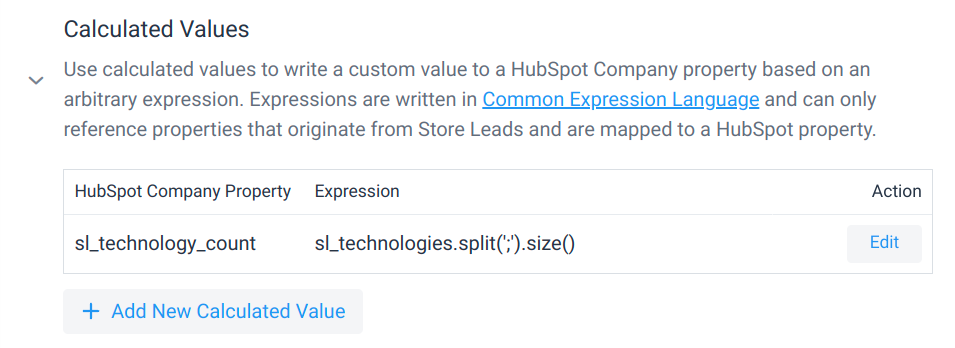
Example Expressions
sl_technologies.split(';').size()
Returns the number of different technologies used on the domain.
sl_technologies.contains('Affirm')
Returns true if the domain is using the Affirm technology.
sl_categories
.split(';')
.map(s, s.startsWith('/Apparel') ? 'Apparel, Footwear & Accessories' :
s.startsWith('/Beauty & Fitness') ? 'Health & Beauty' :
s.startsWith('/Home & Garden') ? 'Home Goods & Furniture' :
s.startsWith('/Sports') ? 'Outdoor & Sporting Goods' :
s.startsWith('/Health') ? 'Health & Beauty' :
s.startsWith('/Pets') ? 'Pets' :
s)
.join(';')
Maps Store Leads category names to custom category names.
In addition to the mapped fields, expressions can also reference data that Store Leads collects for each domain.
Limitations:
- An expression cannot reference a property that does not originate from Store Leads.
Writing expressions can be a little tricky, so don't hesitate to ask for help.
Note that calculated values are only available on the Enterprise plan.
Manual Creation of HubSpot Companies
The HubSpot integration allows you to manually create companies in HubSpot from Store Leads domains. To do so, click on the HubSpot tab in the domain detail view.

As long as the domain does not already exist in HubSpot, you'll be given the option to create a HubSpot company for the domain.

As soon as you click Create Company in HubSpot, Store Leads will create a new HubSpot company for the domain and set all the standard and custom fields configured for the integration.
Manual Update of HubSpot Companies
When you're looking at a domain in Store Leads that already exists as a HubSpot company, the HubSpot tab will show you details for the existing HubSpot company and any contacts linked to the company. Click on the "Enrich HubSpot Company" button to trigger a manual enrichment of the company.
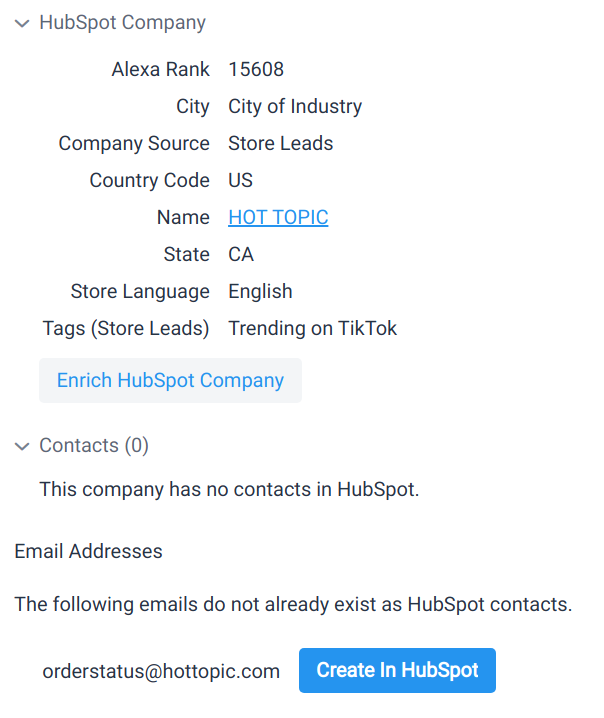
Bulk Creation of HubSpot Companies
The easiest way to bulk create companies within HubSpot is to create a List and then synchronize that list to Hubspot.
Bulk Creation of HubSpot Companies (via CSV Import)
To bulk create new HubSpot companies, you can also use the Export tool to export data from Store Leads and then import it into HubSpot. When exporting, select the HubSpot Company CSV format. Since HubSpot does not let you upload a CSV that mixes new and existing companies, the resulting CSV file will only include domains that do not already exist in HubSpot.
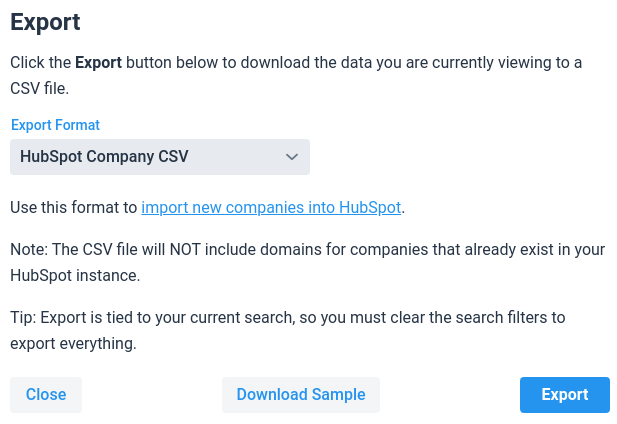
Follow the HubSpot instructions for uploading the resulting CSV to HubSpot. You'll be asked how to handle fields that conflict with existing information (overwrite or ignore) and you'll be given the option to apply custom tags.
Note: this feature is only available to accounts on the Pro or Elite plans.
Bulk Update of HubSpot Companies (via CSV Import)
To bulk update existing HubSpot companies, use the Export tool and select the HubSpot Company Update CSV format. The resulting CSV file will only include domains that already exist in HubSpot. Each row will include a unique identifier to ensure that duplicates are not created.
Note: this feature is only available to accounts on the Pro or Elite plans.
Automatic HubSpot Company Updates On New Store Leads Data
By default, we automatically keep the data you store in HubSpot in sync with the latest data on Store Leads by updating all your HubSpot companies as soon we publish new data (done weekly, typically on a Sunday night.
You may disable this behavior by unchecking the "Enrich Companies" option.

Instead of waiting until the next weekly data update, it is possible to manually trigger enrichment of all existing HubSpot companies. This can be useful if you change your Company Property Mappings and want the apply the changes to all HubSpot companies. To do so, click the "Enrich All Now" button.

Note: this feature is only available to accounts on the Pro or Elite plans.
Automatic HubSpot Company Updates On Changes within HubSpot
When a new company is created or updated within HubSpot (e.g., manually creation in the HubSpot UI), we'll automatically update it immediately with all our available data.
Note: this feature is only available to accounts on the Pro or Elite plans.
Automatic HubSpot Company Creation On New Store Leads Data
New HubSpot companies can automatically be created during our weekly data updates for stores matching any custom criteria. This is can be done by using a "HubSpot Company Action" within a Workflow.
Every week, as soon as we complete our data update, we'll find all stores matching the workflow criteria and create new HubSpot companies for all stores that do not already exist in HubSpot.
As an example, you can define a list as a saved search that contains all stores with at least 250,000 Instagram followers. By enabling this option on the list, you can ensure that your HubSpot instance will include all companies that have at least 250,000 Instagram followers (both now and in the future).
Note: this feature is only available to accounts on the Pro or Elite plans.
Activity Timeline
It is possible to send various events to the HubSpot activity timeline for companies. For instance, you may choose to send technology install/uninstall events so that you can define HubSpot workflows that are triggered when a store installs a specific technology.
For more information, see our documentation on Workflows.
Note: this feature is only available to accounts on the Pro or Elite plans.
Contact Enrichment
Existing HubSpot contacts can be automatically enriched every week when we publish our weekly data update. Contacts will only be enriched if they are linked to a HubSpot company and that company has a Domain Property that matches a store in our database that your plan can access. It is also possible to enrich HubSpot contacts as soon as they are created or changed. To enable this, check the "Enrich contacts" option.

HubSpot Contact Properties
Use the "Contact Property Mapping" section to customize the properties set on contact objects. The list of available properties for contacts is the same as the list of properties available for companies (see "HubSpot Company Properties" section above).
Calculated Values for Contacts
In addition to the properties configured in the Contact Property Mapping section, it is also possible to write calculated values to contact properties. Calculated values write the results of an arbitrary expression to properties in HubSpot. Expressions are written in Common Expression Language.
Example Expressions
sl_technologies.split(';').size()
Returns the number of different technologies used on the domain.
sl_technologies.contains('Affirm')
Returns true if the domain is using the Affirm technology.
sl_categories
.split(';')
.map(s, s.startsWith('/Apparel') ? 'Apparel, Footwear & Accessories' :
s.startsWith('/Beauty & Fitness') ? 'Health & Beauty' :
s.startsWith('/Home & Garden') ? 'Home Goods & Furniture' :
s.startsWith('/Sports') ? 'Outdoor & Sporting Goods' :
s.startsWith('/Health') ? 'Health & Beauty' :
s.startsWith('/Pets') ? 'Pets' :
s)
.join(';')
Maps Store Leads category names to custom category names.
In addition to the mapped fields, expressions can also reference data that Store Leads collects for each domain.
Limitations:
- An expression cannot reference a property that does not originate from Store Leads.
Writing expressions can be a little tricky, so don't hesitate to ask for help.
Note that calculated values are only available on the Enterprise plan
Automatic HubSpot Contact Updates On New Store Leads Data
We can automatically keep the data you store in HubSpot in sync with the latest data on Store Leads by updating all your HubSpot contacts as soon we publish new data (done weekly, typically on a Sunday night).
You may control this behavior using the "Enrich Contacts" option.

Instead of waiting until the next weekly data update, it is possible to manually trigger enrichment of all existing HubSpot contacts. This can be useful if you change your Contact Property Mappings and want the apply the changes to all HubSpot contacts. To do so, click the "Enrich All Now" button.

Note: this feature is only available to accounts on the Pro or Elite plans.
Manual Creation of HubSpot Contacts
The HubSpot integration allows you to manually create contacts in HubSpot from Store Leads domains. To do so, ensure that the following option is enabled for your HubSpot Integration.

Note that enabling this option requires that we scan all your existing contacts in HubSpot. We need to know which contacts already exist so that we do not create duplicate contacts. See the Information Security Considerations section for more information.
After the option is enabled, click on the HubSpot tab in the domain detail view.

You will see a list of existing contacts for the HubSpot company (if any) or contacts with an email domain that matches the domain of the store that you're currently looking at (if any). You'll also have the option to create new HubSpot leads from the generic emails in the Store Leads database.
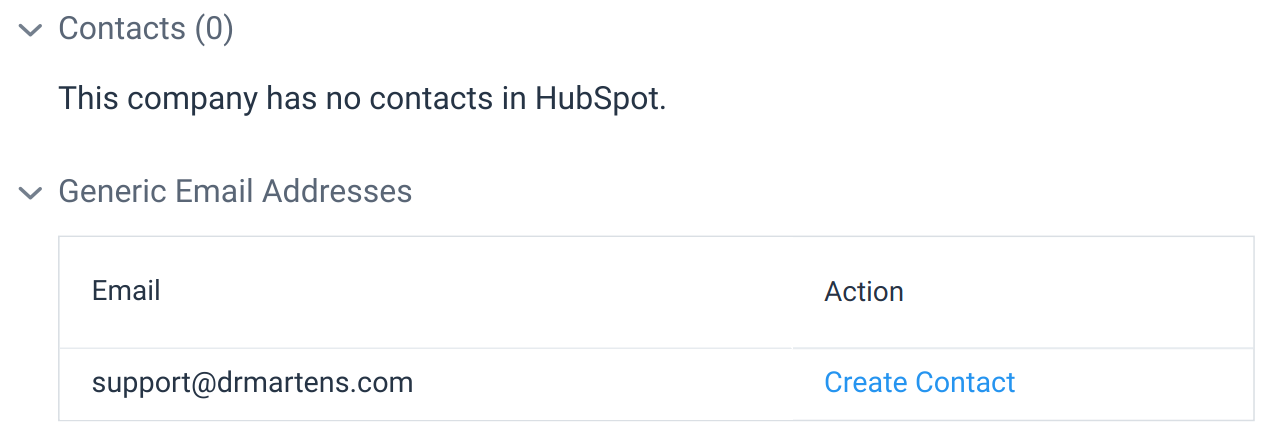
Automatic HubSpot Contact Creation
To automatically create contacts in HubSpot as part of our weekly data updates, ensure that the following option is enabled for your HubSpot Integration.

With the option enabled, you'll be able to configure a workflow to automatically create new contacts in HubSpot.
Showing HubSpot Data Within Store Leads
To view HubSpot data directly within Store Leads, go to the HubSpot tab in the store details.
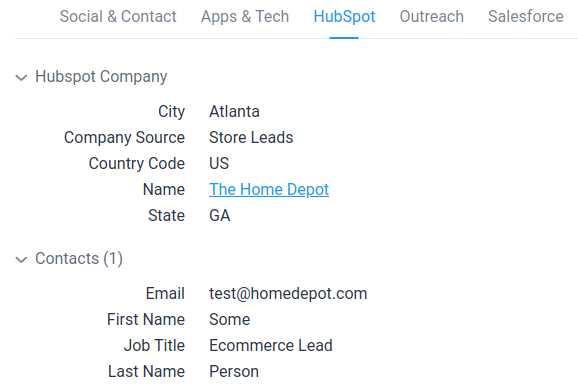
Here are more details on displaying HubSpot data within Store Leads.
Search Filter
With the HubSpot integration enabled, new search filters are available that can be used to show all stores in the database that also exist as companies (or contacts) in your HubSpot instance. This filter is also supported in Advanced Search, allowing you to filter out stores that already exist in HubSpot (a great way to look at new leads).
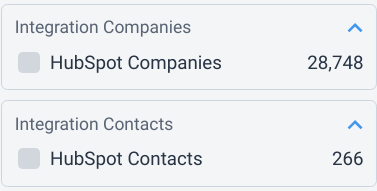
To filter out stores that already exist in HubSpot, run an Advanced Search, and create a filter on the "Integration Companies" field with Operation set to "Not Or".
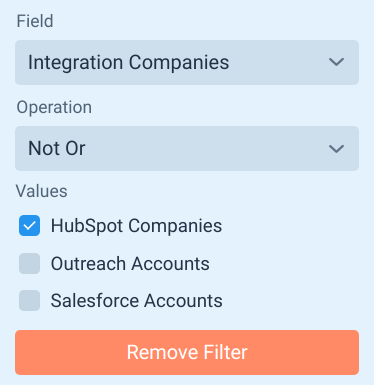
Notes:
- These search filters are only available to accounts on the Pro or Elite or Enterprise plans.
Custom Search Filters
Accounts on the Enterprise plan can also use arbitrary properties in HubSpot as Store Leads search filters. To get started:
- go to the Integrations page
- click on HubSpot
- click on the Search tab
- Select the Company Properties to use as Store Leads search filters
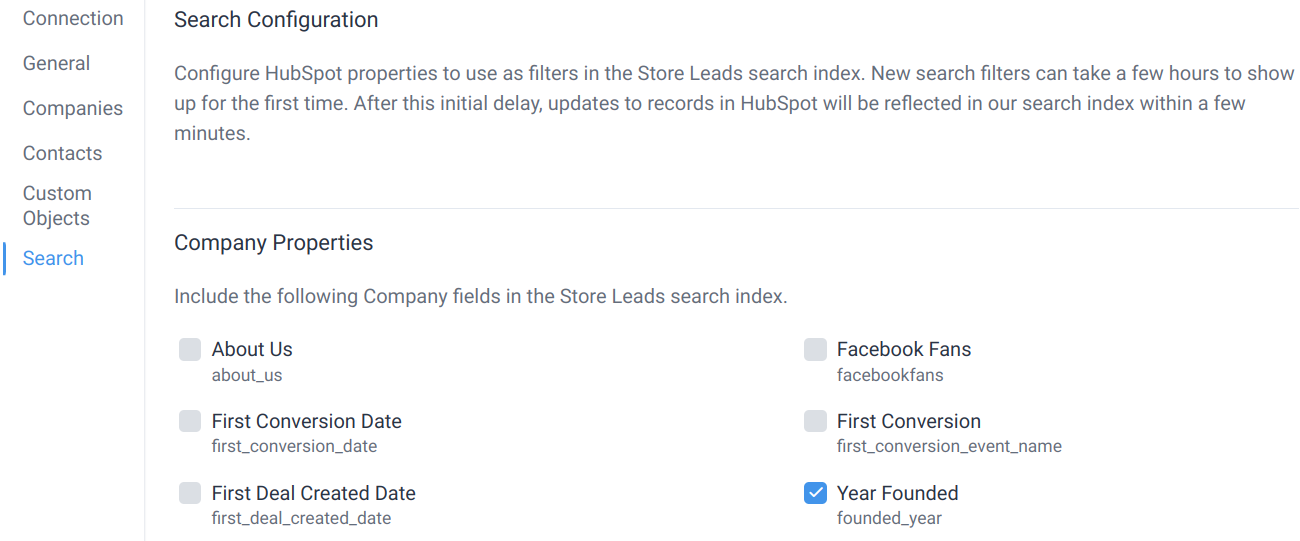
Newly created custom search filters will take a few hours to appear in Store Leads but, after this initial delay, any updates to records in HubSpot will be reflected in the Store Leads search index within a few minutes.
Custom search filters can be used in Basic and Advanced search.
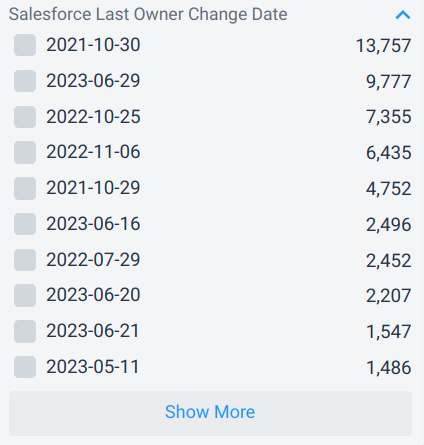
Search Results
HubSpot data can be displayed as a column in search results. To do so, customize the columns displayed in search results to include "HubSpot Company".
This provides a way to visually filter search results by showing the stores that already exist in HubSpot. You can also click on the "HubSpot Company" link to open the HubSpot Company page directly from search results.
Store Details
With the HubSpot integration enabled, a new "HubSpot" tab is available when viewing store details.

The list of fields to display for HubSpot Companies and Contacts can be fully customized. Data display is fetched on demand from the HubSpot API and is never stored by Store Leads. For more details, read displaying HubSpot data within Store Leads.
Chrome Extension
It's also possible to display data for HubSpot Companies and Contacts within the Store Leads Chrome Extension.
Best Practices
- Connect your organization to HubSpot using a dedicated HubSpot API account. If you connect to HubSpot using an account linked to a person, the Store Leads integration with HubSpot will break if that person's account is disabled in HubSpot (which often happens when the person leaves the company).
- Each person using Store Leads should also connect to HubSpot with their personal account. If they do not, then all HubSpot API calls made when using Store Leads are done with the organization connection. As a result, newly created accounts and leads will not be attributed to the right person.
Information Security Considerations
Since your HubSpot instance contains PII, it is natural to have concerns about information security when connecting a new app to HubSpot. Here is an overview of how Store Leads interacts with HubSpot.
After the HubSpot integration is enabled, Store Leads will query all Company records to determine which of the stores in our database already exist as Companies in HubSpot. This is necessary so that:
- the Store Leads web interface/chrome extension can tell whether a store already exists in your CRM, and
- to enrich all your existing Company records on a weekly basis and
- to prevent creating duplicate records
To accomplish this, each Company's Domain and Id properties are retrieved using the HubSpot API and stored in our database. These are the only attributes accessed at this time.
By default, only Company enrichment is enabled. If you choose to enable the "Enrich Contacts" option in your integration (or manual creation of contacts), then we also need to pull and persist the Contact Id and the Contact's email domain (which is obtained from the contact's email address) for the same reasons listed above. The email address is never persisted in raw form. Instead, a one-way hash of the email is persisted so that we can show you which emails (from our database) already exist in your HubSpot instance.
The only time that attributes other than Domain and Id are retrieved for an Company record (or Email/Domain/Id for Contacts), is when a Store Leads user looks at the HubSpot data for a Company or Contact through the Store Leads website or Chrome extension. Both of those features allow each user to configure which properties to pull from the CRM but these properties are never stored. They are pulled from the HubSpot API live (to render the page) and never persisted. This data might include PII but since a) it is not persisted and b) it is configurable, it should hopefully be a minor concern.
 Store Leads
Store Leads